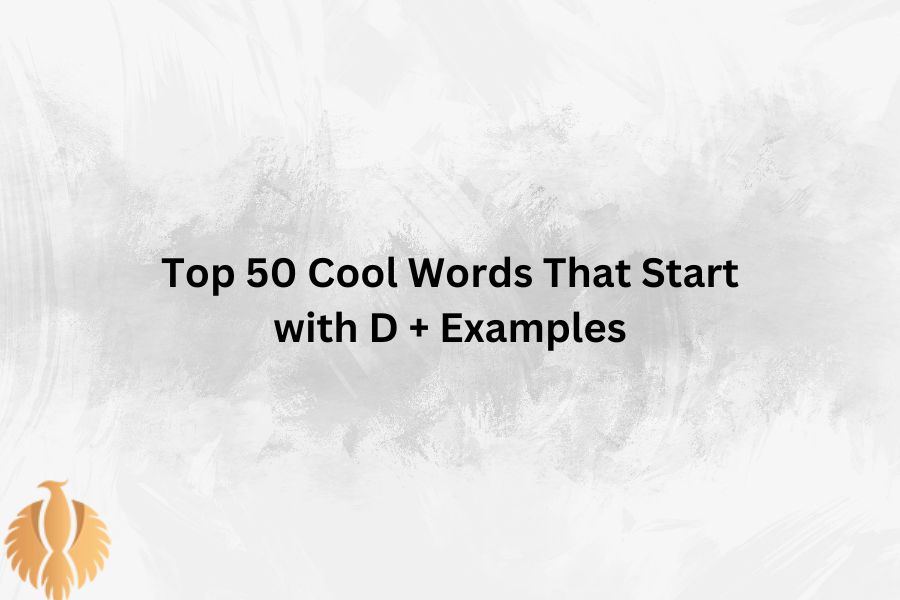The letter D, a seemingly simple character in the modern English alphabet, carries with it a rich and compelling history that spans millennia.
From its origins in ancient Egyptian hieroglyphs to its current form, D has undergone significant transformations, each phase reflecting the cultural and linguistic shifts of its time.
Initially depicted as a hand and later evolving into a symbol resembling a door in early Semitic alphabets, D’s journey is a testament to the dynamic nature of language and writing systems.
As we delve into the fascinating story of D, we will uncover its evolution through various civilizations, its diverse applications in modern contexts, and the enduring impact it has had on communication.
Join us as we explore the intricate history and multifaceted significance of the letter D, a character that continues to play a vital role in our daily lives.
You might also enjoy:Too Cute Meaning Vs To Cute (To Vs Too) + Examples
Quick Guide to Navigating Our List
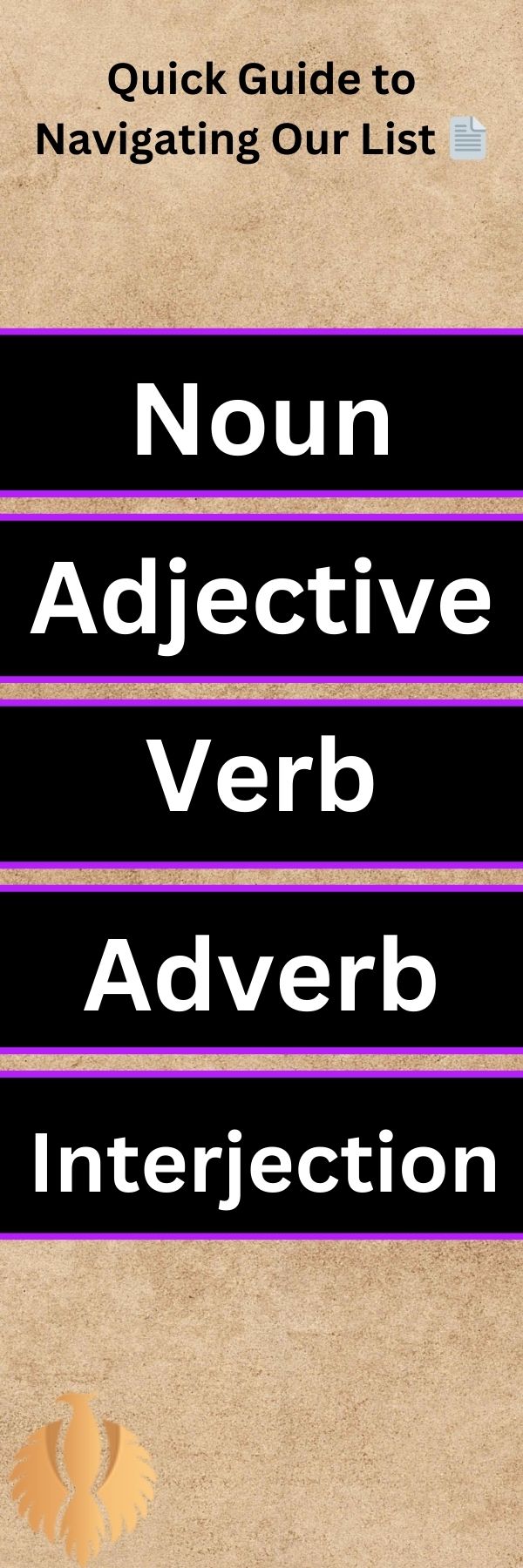
In the diverse world of English grammar, words are categorized into various groups based on their roles in sentences.
These groups, known as ‘parts of speech,’ form the foundation of language, allowing you to effectively communicate your thoughts, ideas, and emotions.
- Noun: A term that symbolizes an individual, location, object, or concept. For example, “delight” (a thing). You might say, “The surprise party was a complete delight.”
- Adjective: An adjective is a term that characterizes or alters a noun. For instance, “dynamic,” which describes someone or something as energetic and forceful. In a sentence, you could say, “He is known for his dynamic personality.”
- Verb: A verb is a term that signifies an action, event, or condition of existence. An example is “dance.” In the sentence, “They dance with such grace,” “dance” is the verb, indicating the action performed.
- Adverb: An adverb is a word that alters a verb, adjective, or another adverb. For instance, “diligently” is an adverb. In the sentence, “She studied diligently for her exams,” “diligently” modifies the verb “studied,” indicating how the action was carried out.
- Interjection: A word or phrase that expresses strong emotion or surprise; it can stand alone or be inserted into a sentence. An example is “Dazzling!” In a sentence, you might say, “Dazzling! The fireworks lit up the night sky.”
These ‘parts of speech’ are the essential elements for selecting the right type of word that starts with the letter D. Whether you’re looking for a noun, adjective, verb, or adverb, this guide will help you find the perfect word.
History of the Letter D
The history of the letter D is both rich and fascinating, beginning with ancient civilizations and continuing to the present day.
The origins of D can be traced back to an ancient Egyptian hieroglyph representing a hand, pronounced as “d.”
This pictograph was incorporated into early Semitic alphabets as “dalet” (or “daleth”), meaning “door.” Initially, the Semitic dalet resembled a door, but over time, it became more abstract, taking on shapes like a triangle or a fish on its side.
The Phoenicians further simplified this character while retaining the /d/ sound, resulting in a form that looked more like a bent line.
When the Greeks adopted the Phoenician alphabet, they inherited this character as “delta,” transforming it into a triangle, which remains its shape in the Greek alphabet today.
The Etruscans, and later the Romans, borrowed the Greek alphabet, preserving the /d/ sound of delta but altering its shape back to a form more akin to the Phoenician version. This eventually evolved into the ‘D’ shape we recognize today.
In the modern English alphabet, D is the fourth letter and typically represents the /d/ sound, as in “dog” or “door.” However, its pronunciation can vary in some instances, such as in “Wednesday.”
In contemporary symbolic usage, D represents various concepts across different fields. D is a symbol used in music to represent a specific note within the diatonic scale. In Roman numerals, D stands for the number 500.
In academic grading, D often signifies poor performance. In physics and engineering, ‘d’ frequently symbolizes differential quantities.
The journey of D, from its pictographic beginnings to its modern abstract form, illustrates how scripts evolve over time, reflecting the changing needs and influences of their users.
Each stage in the evolution of D has left a lasting impact, shaping its current form and function in our modern alphabet.
You might also enjoy:Boys’ or Boy’s– Which One is Correct? + Example
Cool words starting with D
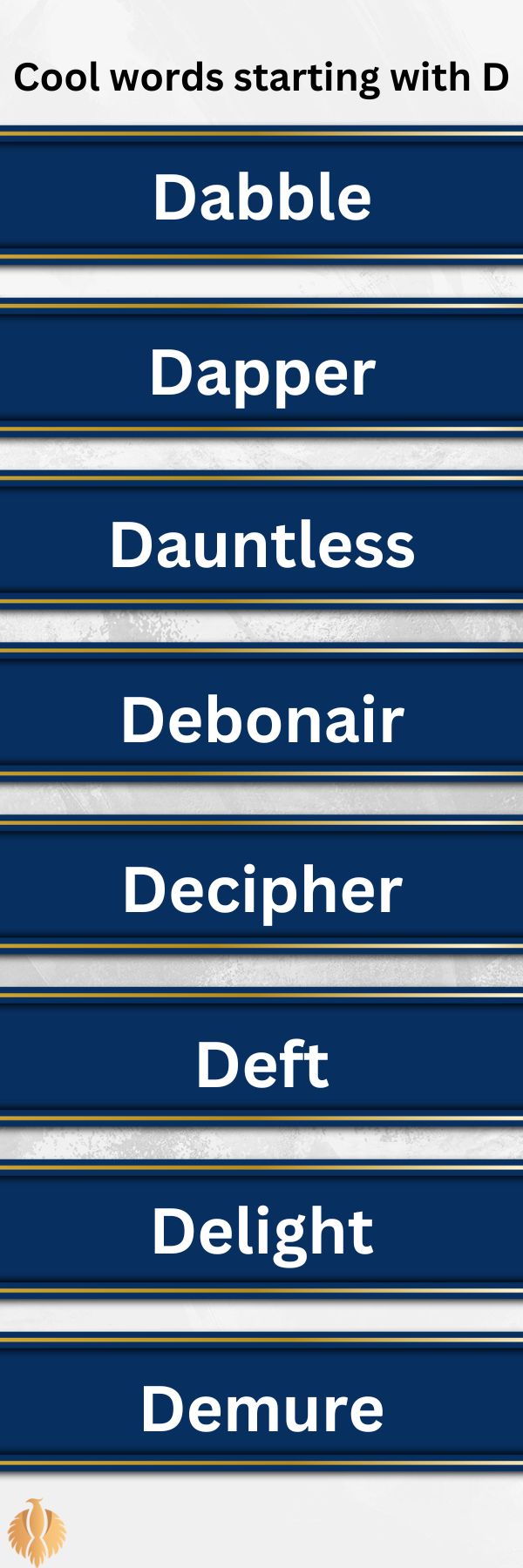
- Dabble
Definition: Participating in an activity with a lack of seriousness or depth.
Example: “She likes to dabble in painting on weekends, even though she’s not a professional artist.”
- Dapper
Definition: Impeccably dressed and well-groomed in appearance.
Example: “He looked quite dapper in his new suit at the wedding.”
- Dauntless
Definition: Showing fearlessness and determination.
Example: “The dauntless explorer ventured into the uncharted jungle.”
- Debonair
Definition: Confident, stylish, and charming.
Example: “The debonair gentleman captivated everyone at the gala with his charm.”
- Decipher
Definition: To convert a text written in code, or a coded signal, into normal language.
Example: “Maria worked tirelessly to decipher the ancient script.”
- Deft
Definition: Neatly skillful and quick in one’s movements.
Example: “Mr. Dandelion’s deft handling of the dough impressed everyone in the kitchen.”
- Delight
Definition: Great pleasure.
Example: “The children’s faces lit up with delight when they saw the fireworks.”
- Demure
Definition: Reserved, modest, and shy.
Example: “She gave a demure smile when complimented on her performance.”
- Denizen
Definition: A resident of a specific location.
Example: “The denizens of the forest include deer, foxes, and many species of birds.”
- Deplore
Definition: To feel or express strong disapproval of something.
Example: “The committee deplored the lack of funding for the arts program.”
- Dexterous
Definition: Exhibiting a high level of dexterity, particularly in manual tasks.
Example: “The magician’s dexterous fingers made the card trick look effortless.”
- Dichotomy
Definition: A separation or distinction between two entities that are portrayed as conflicting or completely distinct.
Example: “There is a great dichotomy between Sheila and her husband.”
- Diligent
Definition: Having or showing care and conscientiousness in one’s work or duties.
Example: “Amber’s diligent efforts in studying resulted in great scores.”
- Discombobulate
Definition: To confuse or disconcert; upset; frustrate.
Example: “The sudden change in plans discombobulated everyone at the meeting.”
- Disdain
Definition: Disregard or lack of respect towards someone or something due to a perceived lack of worthiness.
Example: “She looked at the messy room with disdain.”
You might also enjoy:To Bad Or Too Bad – Correct Grammar + Examples [2024]
- Disparate
Definition: Essentially different in kind; not allowing comparison.
Example: “The two cultures were so disparate that it was hard to find common ground.”
- Dissonance
Definition: Lack of harmony among musical notes.
Example: “The dissonance in the band performance was awful.”
- Diverse
Definition: Displaying a wide range of diversity; extremely distinct.
Example: “München is known for its diverse population and cultural richness.”
- Docile
Definition: Ready to accept control or instruction; submissive.
Example: “The docile dog quickly learned to follow commands from Jaden.”
- Dogged
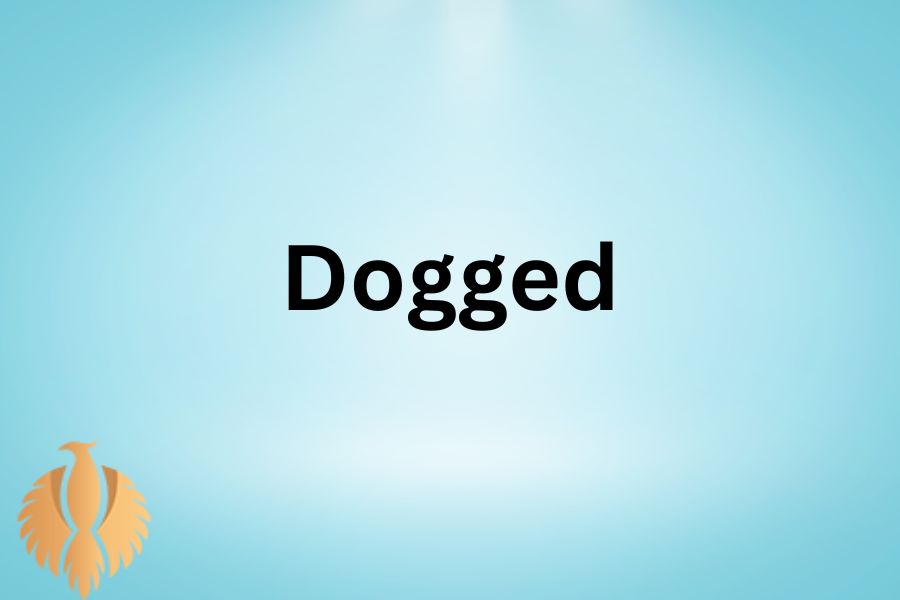
Definition: Demonstrating unwavering determination and relentless perseverance.
Example: “Peter’s dogged determination helped him overcome obstacles in his marriage.”
- Doldrums
Definition: A phase of dormancy, stagnation, or despondency.
Example: “After the project ended, she found herself in the doldrums, unsure of what to do next.”
- Domicile
Definition: The place where a person establishes their permanent residence or has a strong and meaningful tie.
Example: “Fin changed his domicile to Iraq after retiring.”
- Doughty
Definition: Brave and persistent.
Example: “The doughty knight faced the dragon without fear.”
- Dovetail
Definition: To fit or cause to fit together easily and conveniently.
Example: “The two plans dovetail perfectly, making the project run smoothly.”
- Draconian
Definition: Excessively harsh and severe.
Example: “The new law was criticized for its draconian measures.”
- Droll
Definition: Peculiar or uncommon in a manner that elicits wry amusement.
Example: “His droll sense of humor always made his friends laugh.”
- Dubious
Definition: Hesitating or doubting.
Example: “She was dubious about the effectiveness of the new policy.”
- Dulcet
Definition: Sweet and soothing (often used ironically).
Example: “The dulcet tones of Celine’s voice captivated the audience.”
- Dynamo
Definition: A machine for converting mechanical energy into electrical energy; a person with a lot of energy.
Example: “Maggie’s a real dynamo, always full of ideas and energy.”
- Dystopia
Definition: A fictional realm or community characterized by extensive hardship or unfairness, often resembling a totalitarian or post-apocalyptic setting.
Example: “The novel is set in a dystopia where freedom is a distant memory.”
You might also enjoy:Which of the Following: Definition + Complete Usage + Grammar
- Debacle
Definition: An abrupt and humiliating collapse; a debacle.
Example: “Saipa’s new product launch turned into a debacle.”
- Decadent
Definition: Demonstrating a condition of ethical or cultural deterioration.
Example: “The great empire of Ghajar fell into a decadent state.”
- Deftly
Definition: In a manner that is both adept and swift in execution.
Example: “Maryam deftly wove the threads into a beautiful tapestry.”
- Delectable
Definition: Delicious.
Example: “The chef prepared a delectable meal that everyone enjoyed.”
- Deluge
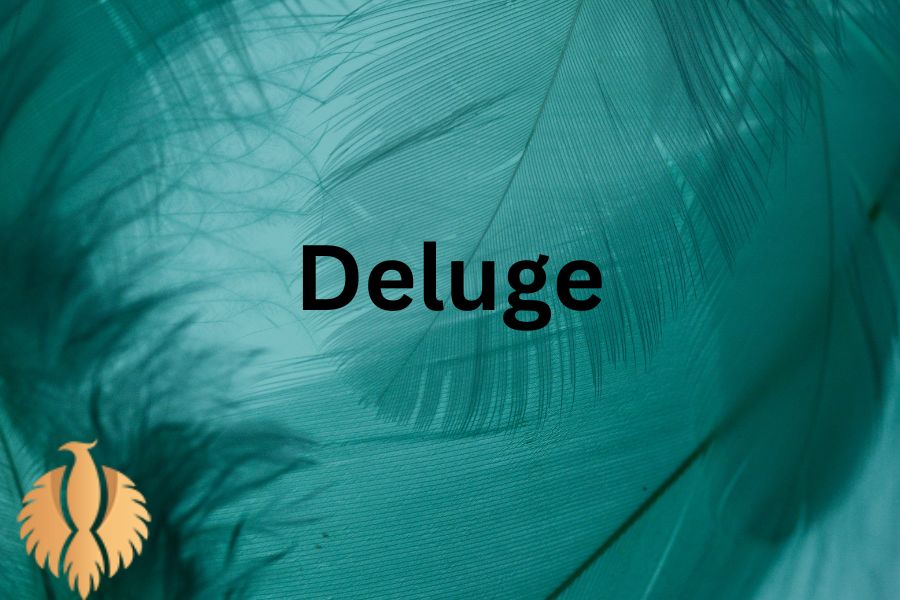
Definition: A severe flood.
Example: “The deluge caused widespread damage in the town.”
- Demagogue
Definition: A political leader who garners support by tapping into the wants and biases of the general population instead of relying on logical reasoning.
Example: “The demagogue’s speeches stirred up the crowd.”
- Denouement
Definition: The concluding section of a play, film, or story in which the various elements of the plot are brought together, and issues are clarified or settled.
Example: “The Separation movie’s denouement was both surprising and confusing.”
- Desolate
Definition: A location devoid of inhabitants, characterized by a stark and desolate void.
Example: “The once-bustling town was now desolate and abandoned.”
- Despondent
Definition: Feeling despondent due to a lack of hope or bravery.
Example: “After the defeat, the team was despondent and silent.”
- Diaphanous
Definition: Light, fragile, and sheer, particularly when referring to fabric.
Example: “She wore a diaphanous dress that fluttered in the breeze.”
- Didactic
Definition: Designed for educational purposes, especially with the aim of imparting moral lessons.
Example: “The didactic novel aimed to impart important life lessons to its readers.”
- Diffident
Definition: Reserved because of a lack of self-belief.
Example: “He was diffident about his achievements, always downplaying his success.”
- Diminutive
Definition: Extremely or unusually small.
Example: “The diminutive figure of the old man was barely visible in the crowd.”
- Disparate
Definition: Essentially different in kind; not allowing comparison.
Example: “The two theories were so disparate that they couldn’t be reconciled.”
- Disseminate
Definition: Spread (something, especially information) widely.
Example: “The organization works to disseminate information about health and wellness.” ♂️
- Dissonant
Definition: Lacking harmony.
Example: “The dissonant chords in the music created a sense of unease.”
- Dissuade
Definition: Convince the individual to refrain from pursuing a specific course of action..
Example: “Martic tried to dissuade Sophie from quitting her job without having another one lined up.”
- Divulge
Definition: Make known (private or sensitive information).
Example: “Luna refused to divulge the details of her friendship with Markus.”
- Docile
Definition: Ready to accept control or instruction; submissive.
Example: “The docile horse was easy to train.”
- Dubious
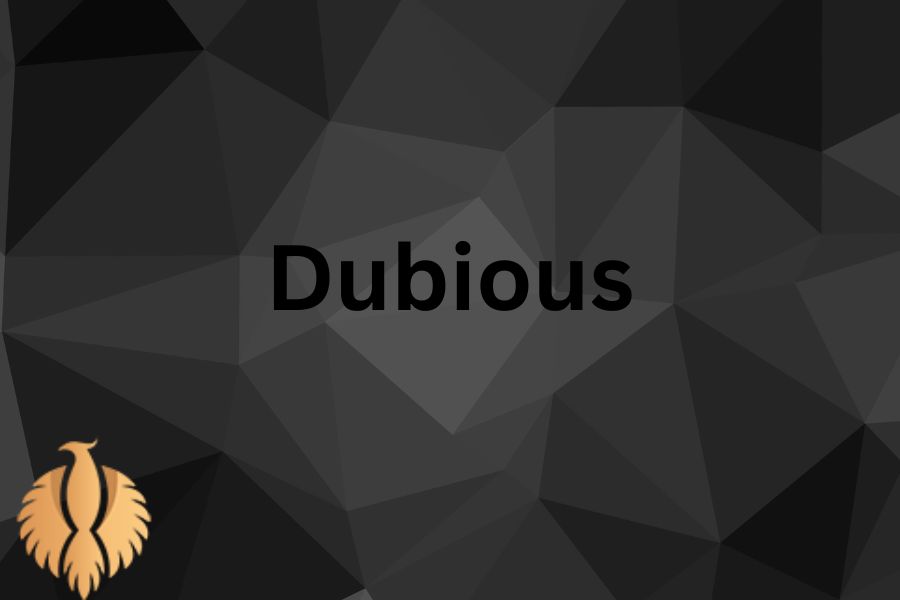
Definition: Hesitating or doubting.
Example: “She was dubious about the effectiveness of the new policy.”
You might also enjoy: Top 30 Gambling Phrases and Idioms In 2024
More frequent words
Certain words starting with the letter D are more frequently utilized than others. Presented below are a few of the most used positive and influential words that begin with D.
- Determination
- Delight
- Dedication
- Daring
- Dynamic
- Dream
- Dazzling
- Distinctive
- Discerning
- Dignified
You have complete control over how often you choose to incorporate words that begin with the letter D. We are confident that our selection has provided you with a wide range of dynamic D words, enriching your communication in a delightful manner.
We are bold enough to claim that you have found it to be impressive and advantageous to use these words whenever you wish to add a hint of drama or a sense of determination to your discussions or writing! ✍️
You might also enjoy: Top 100 Commonly Used Verbs That Start With A [2024]
Conclusion
Expanding your lexicon is synonymous with broadening your intellectual horizons and improving your ability to articulate your thoughts and emotions with precision.
By incorporating words such as ‘diligent,’ ‘dynamic,’ and ‘dawn,’ you are not only acquiring new vocabulary, but also acquiring subtle ways to convey positivity and motivation.
‘Diligent’ can elevate a basic ‘hard-working’ to a meticulous dedication, ‘dynamic’ injects vitality into everyday energy, and ‘dawn’ elevates ‘beginning’ to a brilliant new commencement.
The greater the number of words you have at your disposal, the more accurately and vividly you can translate your thoughts into spoken and written language.
Therefore, by expanding your vocabulary, particularly with positive and impactful terms, you are equipping yourself to interact more effectively and inspiringly with the world around you.

Hi, welcome to my blog! My name is Omid and I am thrilled to have you here! I am an English language teacher with 12 years of experience and hold multiple international certifications (TESOL, IELTS, TOEFL, PTE, CELTA). Additionally, I hold a PhD in Applied Linguistics with a specialization in Teaching English as a Second Language (TESL), which fuels my passion for teaching English and assisting others in mastering the language. To me, nothing is more rewarding than helping individuals enhance their English language abilities through various methods. So, let’s embark on this journey of learning English together.

